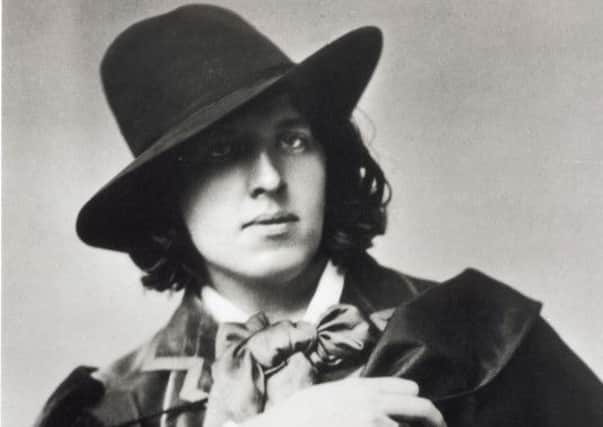Book review: Wilde in America by David Friedman


Wilde in America: Oscar Wilde and the Invention of Modern Celebrity
by David Friedman
WW Norton, 320pp, £17.99
Chances are you’ll never come across a conversation as scintillating as the one Oscar Wilde was overheard conducting in San Francisco in 1882. At the time, he was 27 and still hadn’t written any of the works that would earn his fame. It didn’t matter. Already his verbal verve and outlandish dress (satin breeches, velvet jackets, black cape) had made him the toast of London society and on a 10-month tour of America, the reaction was just the same. “It was a superb performance, a masterpiece of sparkling wit and gaiety,” wrote one audience member in an account of the event. “Never before, or since, have I heard anything that compared to it.” Who was Wilde’s lucky interlocutor? It was a dressmaker’s dummy: Oscar was just talking with himself.
Advertisement
Hide AdWilde captivated an even unlikelier audience at the bottom of a silver mine in Colorado, where he told the miners all about Cellini and Renaissance metal working, then drank them under the table. By his own account, “I brilliantly performed, amidst unanimous applause.”
Without Wilde’s aptitude for self-promotion, David Friedman maintains, there might have been no Andy Warhol, no Paris Hilton, no Kim Kardashian. He, though, was the first to realise that celebrity could come before accomplishment. As Friedman succinctly put is: “Fame would launch Wilde’s career, not cap it.”
No-one before Wilde, he argues, had used the press so skilfully to establish a claim to renown, proving his point by following his subject from interview to interview, state to state, charting the shrewd steps Wilde took to build his brand, “devising a formula for creating fame that other modern celebrities – all of them far more shallow than he – are using today, whether they know it or not.”
Wilde was born in Dublin in 1854 to Dr William Wilde, a rakish eye doctor and folklorist, and his “extravagantly extroverted” wife, the poet and saloniste Jane Francesca Agnes Elgee. Lady Wilde gave weekly soirées at the family’s Dublin home, where her young son absorbed the raconteur’s art. “It was from Lady Wilde that Oscar learned that identity is a kind of fiction,” Friedman writes, “and that being oneself is a form of playacting.”
He carried that lesson to Oxford, where he swiftly created a new role for himself, losing his Irish accent, buying new clothes and polishing his aphorisms. His aim, Friedman explains, was not merely to “become the self-anointed leader of Oxford’s student aesthetes, preaching to his classmates the Divine Gospel of Beauty”. “Somehow or other I’ll be famous,” he said, “and if not famous, I’ll be notorious.”
About the only thing of note Wilde had accomplished in London before boarding the ocean liner that took him to New York was to incur the mockery of the librettist WS Gilbert, who was so exasperated by Wilde’s peacocking ways that he wrote an operetta satirising the aesthetic movement. Called Patience, it starred a “grandiose boob” named Bunthorne who was given to “dandyish dishonesty and nattering narcissism.”
Advertisement
Hide AdWhen Patience hopped the Atlantic to Broadway, Gilbert and Sullivan’s producer feared New Yorkers weren’t getting the joke. To fix the problem, he persuaded Wilde to travel to America and give talks on his decorative philosophy, clad in Bunthorne get-up. D’Oyly Carte’s office sold Wilde to promoters as a humbugging figure of fun, but Wilde got the last laugh. His tour earned him a small fortune; and he garnered more American press coverage in 1882 than any other Briton, including Queen Victoria.
In his first weeks in Manhattan, Wilde arranged to sit for a formal portrait with the photographer Napoleon Sarony. At the time, New Yorkers were obsessed with collecting cardboard-backed celebrity portraits, the Pokémon cards of the fin de siècle. Wilde instantly saw the value of the trend. Bringing his own costumes to the shoot, he made sure his pose projected “intelligence, poetic sensibility and the self-possessed attitude of a young artist coming into his own”. The results of that photo session so beguiled the public that unscrupulous merchants stole his face to advertise cigars, stoves, freckle cures and bust-enhancing tonics.
Advertisement
Hide AdThese weren’t the only shots Wilde stage-managed. The scores of reporters who followed him on tour found the same set dressing in every hotel room: lilies and sunflowers among party invitations and animal skins tossed over a sofa. Upon entering, they would behold Wilde lounging with a book of poetry, dressed in cloak, satin breeches and velvet slippers, primed for beauteous disquisition. Journalists who reviewed his public performances, expecting them to be fatuous, often found themselves enthralled by Wilde’s rhetorical flights.
Wilde returned to London buoyed by the renown he had achieved overseas (“The milkman has bought your picture!” his mother gushed), and went on to produce a dozen masterpieces of playwriting, criticism and prose before his notoriety overtook his fame. He may indeed have deliberately made himself a commodity, as Friedman shows, and the reproducibility of his image and words can’t be denied. What makes him irreplaceable, however, was the genius he reputedly declared upon setting foot in New York on a January day in 1882 – a genius that, whether he declared it or not, he possessed.
FOLLOW US
SCOTSMAN TABLET AND MOBILE APPS